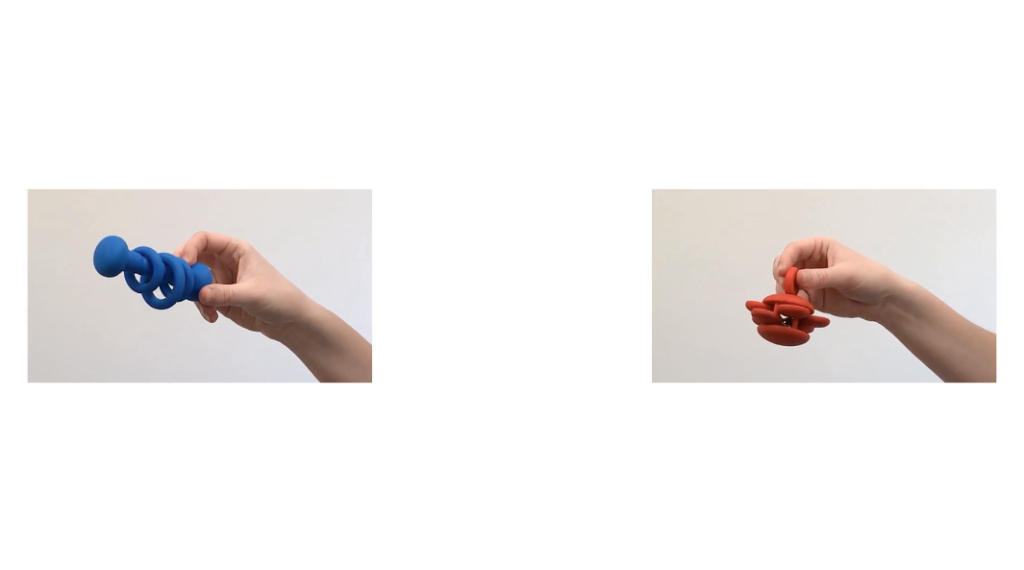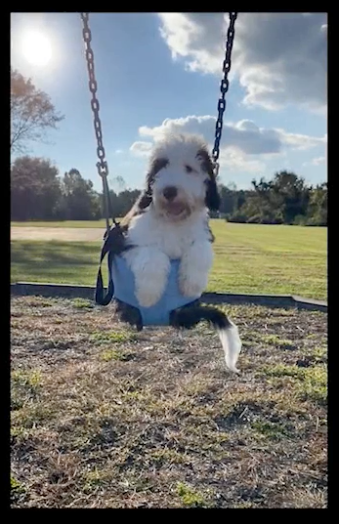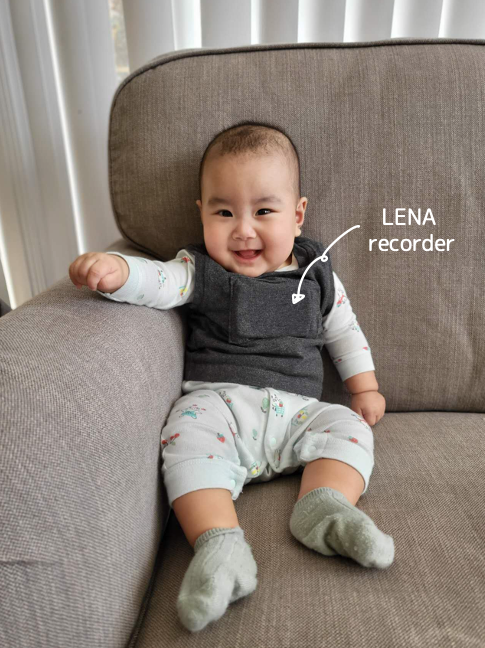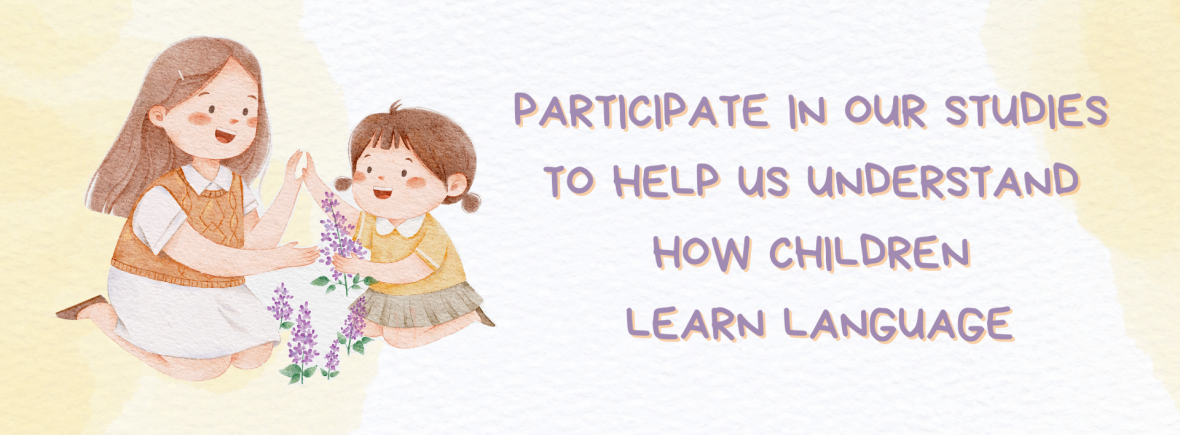We are always looking for families to volunteer their time to visit us in the LILAC Lab. We know you live very busy lives so we appreciate you volunteering your time to language development science! If you choose to participate, our studies offer free parking, free child care for any other children that you have, a small monetary compensation, and a Little Scientist certificate to say “thank you” to our young participants.
Our studies are designed to be fun and engaging for your child! Appointments are usually 30-45 minutes long. In-lab studies usually entail your child listening to some sentences while looking at images or videos on a screen or a play session with you or one of our researchers. During some studies we will videotape your child so that we can watch and determine what your child learned from the study.
We also have some online studies that you can participate from the comfort of your home. For the online studies, we will schedule a 30-45 mins video-conference meeting with you using Microsoft Teams. Your child will watch a short video that we will send you and we will ask you to turn on your webcam to record where they are looking as they watch the video. For some studies, we also collect home language samples to understand the amount and type of language input your child hears on a daily basis.
Check out our active studies here to see if your child is eligible for any studies! Click on the frequently asked questions (FAQ) below for more information. If you would like to talk with someone from the LILAC Lab or sign up for one of our studies, you may call 972-883-2384, email us (lilac.lab@utdallas.edu) or complete our contact form so we can contact you!
FAQs
Learn More about our Research Methods
We are interested in young children’s language development but a major challenge is figuring out what young children know because they cannot or don’t always tell us what they are thinking and what they know! There are a few methods that we use to uncover their language development.
Preferential-Looking Paradigm

In some of our studies, we have our young participants watch a short video with various images on the screen. We then watch where they are looking to answer all kinds of questions on how they learn! For example, they may see pairs of pictures (such as a ball and an apple) and hear a sentence asking them to find one of the pictures (such as “Where is the apple?”).

In some studies, we might teaching young children some novel words (made-up words) and see if one way of teaching them new words is better than another way.

These studies usually last 5-10 minutes. We choose pictures and sentences that are fun for young children and always add interesting videos to keep children’s attention. Left is an example of our lab mascot, Puff the sheepadoodle, who made a cameo appearance in one of our studies!
Right now, we have an active study using this method that you can participate from the comfort of your home. You can read more about the current study or complete a contact form to learn more about this study!
Home Language Samples
In some of our studies, we collect home language samples with small child-friendly recorders worn by toddlers using specially designed vests or t-shirts (see the image on the left for an example). The goal of collecting home language samples is to understand what language your child hears in a typical day. In these studies, we will provide you with the recorders and the vest. All you need to do is to turn the recorder on, put it in the pouch on the vest, put the vest on your child, and continue with your day. The recordings are processed using automatic software to generate daily counts of how many words your child hears and daily counts of how much sounds your child make throughout the day.

What is Participating in a Research Study Like?
We have both online studies and in-person studies. For all studies, we will find a time that is convenient for you and your little human to participate. Most families find that participation is enjoyable and interesting. At the beginning of the appointment, we will explain in detail exactly what will take place during your appointment. You will be able to ask any questions you have before you decide to participate. For our young participants, we do our best to design our studies to be short and fun. You will be with your child at all times during any given study. It’s also a good opportunity to talk with a researcher and find out more about an aspect of your child’s language development.
Do You Pay People to Participate in Your Studies?
Most of our studies offer a small amount of money to compensate participants for travel expenses and time. Children who participate also get a Little Scientist certificate, as a way to show our appreciation to our littlest scientists. We also offer free parking, and free child care for any siblings who come along to an in-person appointment.
How do I Participate in Your Studies?
The best way to get involved is to add you and your child’s information to our participant database. We will contact you whenever your child is eligible for studies in the lab. You are not obligated to say ‘yes’ when we contact you, but we would greatly appreciate your help, as we depend on our local community to conduct our science and learn more children’s language development. Please sign up for our database. Once we reach your information, one of our research staff will reach out to answer any questions you may have and add you to our list!
What Happens After I Join the participant database?
Joining our participant database simply means that you are willing to have us contact you to describe a particular study when your child is eligible. Being part of the database does not obligate you to participate in our studies, it simply gives us the opportunity to give you information about the studies that your child/children are eligible for.
Your information is kept strictly confidential among our researchers and trained research staff – information will never be given to anyone who is not directly affiliated with the lab. Of course, you may withdraw from a study at any time, or have your family’s contact information removed from our records for any reason. If you ever wish to talk with us about this, please call us at 972-883-2384.
How and When Will My Family be Contacted for a Particular Study?
Study eligibility is generally based on ages, languages, and/or diagnoses of children at a given time. If a researcher is actively recruiting for a study in your child’s age group, you may be contacted by e-mail or phone to discuss the study and decide if you would like your child to participate. If you are interested in participating, we will arrange a time for you and your child to come into the lab. You are able to pick and choose which studies you wish to participate in based on your interest and availability.
Where is the LILAC Lab?
We are located on The University of Texas at Dallas main campus in the Callier Richardson building. See the detailed directions to our lab!

